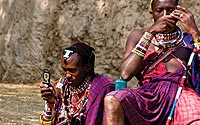Global Texting Rampant, Generates Billions In U.S. Revs
- by Mark Walsh @markfwal, December 20, 2011
 Around the world, people are increasingly using cell phones for more than talking, while social networking is popular mainly in wealthier nations,
according to a new study on global technology usage. The report from the Pew Research Center found that text messaging in particular has become a ubiquitous mobile activity across both wealthy countries and the developing world, with a median of 75% of
cell owners texting.
Around the world, people are increasingly using cell phones for more than talking, while social networking is popular mainly in wealthier nations,
according to a new study on global technology usage. The report from the Pew Research Center found that text messaging in particular has become a ubiquitous mobile activity across both wealthy countries and the developing world, with a median of 75% of
cell owners texting.
In fact, it is most common in two of the poorest nations: Indonesia and Kenya. In China, 80% of mobile users text, along with about 70% on average in Western Europe and 67% in the U.S. Text messaging, however, has lately been viewed as under threat in more mature markets with the emergence of Internet-based messaging alternatives from companies such as Facebook, Apple and BlackBerry-maker Research in Motion.
Juniper Research has forecast that global revenue from text messaging will peak in 2011 before trending down in coming years. For now, it’s still a big business, generating an estimated $23 billion in U.S. revenue this year.
In addition to texting, many are also using their phones to take photos or record video. Half of cell owners in the 21 countries polled did so, with Japanese users the most avid at 72%. Fewer people access the Internet on mobile devices, although more than four in 10 mobile phone owners use their device to go online in Israel (47%), Japan (47%) and the United States (43%).
With Facebook boasting some 800 million active users worldwide, it’s no surprise that social networking has spread. At least a quarter of people surveyed in 15 of 21 countries go on social networks. Leading the way are Israel (53%) and the U.S. (50%), followed by countries such as Russia, Britain and Spain, where more than 40% are social networking.
At the other extreme are poorer countries such as Indonesia (12%,) India (5%), and Pakistan (2%), where a lack of Internet access is the main reason for low participation in social networks. In Egypt, where social tools like Facebook and Twitter played a role in the country’s popular uprising earlier this year, 28% are on social networks.
That figure is up from 18% last year. Only Russia -- also affected by political upheaval this year -- had a similar gain, rising from 33% to 43% involvement in social media. For most other countries, however, there was only minimal change in social networking adoption from 2010 -- suggesting that emerging markets will be the source of future growth for social media providers.
Young people worldwide are eagerly embracing online and mobile technologies. In nearly all countries, people ages 18 to 29 are more likely than those 50 or older to access the Internet on their mobile phone. They are also consistently more likely to use their cell phones for texting and taking pictures or video.
When it comes to social networking, most adults under age 30 use social sites in 13 of 21 countries. The U.S. is the only country where even a quarter of people 50 or older engage in social media. Even among Internet users, older people are consistently much less likely to be found on Facebook or other social properties than those under 30.
The survey, by the Pew Research Center’s Global Attitudes Project, was conducted through telephone and in-person interviews from March 21 to May 15.


